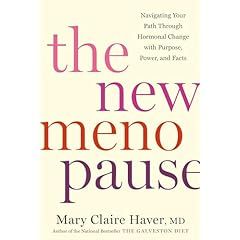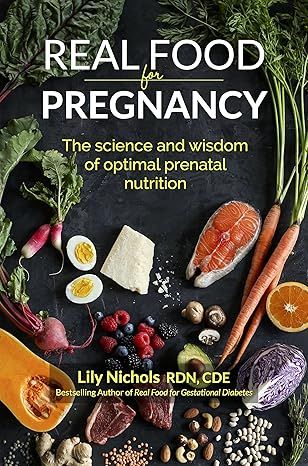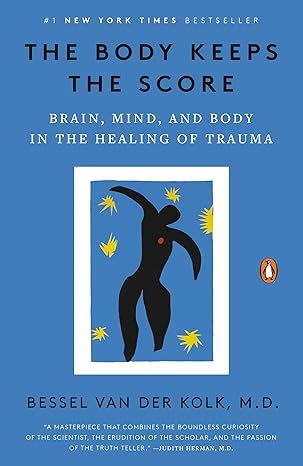The New Menopause
4.7
-
1,432 ratings
#1 NEW YORK TIMES BESTSELLER • Filling a gaping hole in menopause care, everything a woman needs to know to thrive during her hormonal transition and beyond, as well as the tools to help her take charge of her health at this pivotal life stage—by the bestselling author of The Galveston Diet.
Filling a gaping hole in menopause care, everything a woman needs to know to thrive during her hormonal transition and beyond, as well as the tools to help her take charge of her health at this pivotal life stage—by the bestselling author of The Galveston Diet.
Menopause is inevitable, but suffering through it is not! This is the empowering approach to self-advocacy that pioneering women’s health advocate Dr. Mary Claire Haver takes for women in the midst of hormonal change in The New Menopause. A comprehensive, authoritative book of science-backed information and lived experience, it covers every woman's needs:
- From changes in your appearance and sleep patterns to neurological, musculoskeletal, psychological, and sexual issues, a comprehensive A to Z toolkit of science-backed options for coping with symptoms.
- What to do to mediate the risks associated with your body's natural drop in estrogen production, including for diabetes, dementia, Alzheimer’s, osteoporosis, cardiovascular disease, and weight gain.
- How to advocate and prepare for annual midlife wellness visits, including questions for your doctor and how to insist on whole life care.
- The very latest research on the benefits and side effects of hormone replacement therapy.
Arming women with the power to secure vibrant health and well-being for the rest of their lives, The New Menopause is sure to become the bible of midlife wellness for present and future generations.
Read more
Kindle
$13.99
Available instantly
Audiobook
$0.00
with membership trial
Hardcover
$19.30
Ships from
Amazon.com
Payment
Secure transaction
ISBN-10
059379625X
ISBN-13
978-0593796252
Print length
320 pages
Language
English
Publisher
Rodale Books
Publication date
April 30, 2024
Dimensions
6.4 x 0.99 x 9.3 inches
Item weight
1.09 pounds
Summary
Filling a gaping hole in menopause care, everything a woman needs to know to thrive during her hormonal transition and beyond, as well as the tools to help her take charge of her health at this pivotal life stage--by the bestselling author of The Galveston Diet.
Menopause is inevitable, but suffering through it is not! This is the empowering approach to self-advocacy that pioneering women's health advocate Dr. Mary Claire Haver takes for women in the midst of hormonal change in The New Menopause. A comprehensive, authoritative book of science-backed information and lived experience, it covers every woman's needs:
- From changes in your appearance and sleep patterns to neurological, musculoskeletal, psychological, and sexual issues, a comprehensive A to Z toolkit of science-backed options for coping with symptoms.
- What to do to mediate the risks associated with your body's natural drop in estrogen production, including for diabetes, dementia, Alzheimer's, osteoporosis, cardiovascular disease, and weight gain.
- How to advocate and prepare for annual midlife wellness visits, including questions for your doctor and how to insist on whole life care.
- The very latest research on the benefits and side effects of hormone replacement therapy.
Arming women with the power to secure vibrant health and well-being for the rest of their lives, The New Menopause is sure to become the bible of midlife wellness for present and future generations.
Read more
Popular highlights in this book
Your symptoms, of which dozens (including the well-known hot flashes and the not so well-known frozen shoulder), are the direct result of declining estrogen.
Highlighted by 108 Kindle readers
The prime window of opportunity for cardiovascular disease is now believed to be within ten years of menopause, meaning if you were to begin using MHT before ten years had passed since your last period, the potential for benefits would be the greatest.
Highlighted by 170 Kindle readers
Product details
ASIN :
B0CG8KXWB1
File size :
9248 KB
Text-to-speech :
Enabled
Screen reader :
Supported
Enhanced typesetting :
Enabled
X-Ray :
Enabled
Word wise :
Enabled
Editorial reviews
Review
“[An]enlightening guide. . . . readers will welcome the affirming tone and the attention paid to less-discussed symptoms. . . . It’s an informative manual on an important yet underdiscussed health matter.”—Publishers Weekly
About the Author
Mary Claire Haver, MD, is a board-certified OB/GYN, a Certified Culinary Medicine Specialist, a Certified Menopause Provider, and the founder of Mary Claire Wellness, a private medical practice that focuses on women in midlife. Her bestselling book, The Galveston Diet, is based on the groundbreaking nutritional protocol she developed as an online subscriber program for women going through perimenopause and menopause. She lives in Galveston, Texas.
Sample
Chapter 1
It’s Not All in Your Head
“We know our bodies; we know when something physically has changed.”“At age forty-seven, I was told by a gynecologist that perimenopause isn’t real and was asked if I had a psychiatrist.”
“I was told by my former doctor that women use menopause as an excuse to gain weight and that it’s not real.”
“I was told that it’s all in your head.”
“Welcome to your new normal.”
“It’s discouraging to not be taken seriously.”
“Consulted my ob-gyn about perimenopause and mood swings, sexual interest. She blew me off and said I was too young for menopause.”
“The migraines are a new symptom. I have only had them a few times, but they were debilitating. My doctor suggests I take Tylenol and lie down. I would prefer to address the cause and not just the symptom.”
“Dr. said it wasn’t perimenopause if I wasn’t having hot flashes.”
“I had to go to an ob-gyn and three cardiologists before I found one who believed me and had knowledge that it could be linked to hormonal changes.”
“I was sent for a full blood screening and thyroid testing. All tests came back with good results, so my complaints were not addressed further.”
“Still suffering.”
That’s just a small sampling of comments shared on my social media and in a research study on women’s experiences with menopausal symptoms. The study, published in the Journal of Women’s Health in 2023, sought to understand what kind of support a patient felt she was getting from her healthcare providers (and how that support could be improved). Overwhelmingly, the responses revealed substandard care and weak support. Many patients felt invalidated or reported that they hadn’t been provided with any help or even given access to information that would allow them to understand the cause of their symptoms. My informal “survey” on my social media posts directed to gynecology patients revealed many of the same sentiments. Women said things like “My doctor told me he doesn’t believe in perimenopause” and “I was told it’s just a natural part of aging, get over it,” and described encountering a medical attitude of “Welcome to your new normal.” Sadly, these experiences aren’t the exception, they are the rule. There are so many problems with this that I’m not even sure where to start. But first on the list is the fact that there are major medical consequences of this denial of care and guidance. If a woman in perimenopause or menopause is not getting top-notch care, it’s a matter of life and death. Really.
Here’s why: your symptoms, of which dozens (including the well-known hot flashes and the not so well-known frozen shoulder), are the direct result of declining estrogen. My patients, colleagues, and I have been taken aback by the emerging research that’s starting to explore the relationship between the menopausal drop in estrogen and issues like chronic cough, tinnitus, and benign position vertigo—just to name a few. These are issues that many women are attributing to “getting old” while they scramble to be believed, get help, and thrive during what should be a powerful and exciting time in their lives.
Estrogen isn’t just a pretty hormone that’s key to reproductive capabilities; it’s responsible for so much more. There are estrogen receptors throughout almost every organ system in your body, and as your levels drop, these cells begin to lose their ability to assist in maintaining your health in other areas, including your heart, cognitive function, bone integrity, and blood sugar balance.
The list goes on, but in these areas alone we can spot a few diseases that regularly land in the top ten causes of death in women: heart disease, stroke, Alzheimer’s disease, and type 2 diabetes. While osteoporosis isn’t on this list, it still presents a serious concern, as one in two women will break a bone in their life because of bone loss from osteoporosis, and hip fractures alone are associated with a 15–20 percent increased mortality rate within one year of the break. All this is to say that estrogen is broadly and profoundly protective of your health, and its diminishing status during perimenopausal and menopausal years is a very big deal and should be treated as such.
In the pages to come, I’ll present you with a head-to-toe tour of just what you can do to prioritize taking care of yourself during this big deal phase. Before we get to the strategies, I want to take a step back and establish some foundational understanding of the myriad ways that hormone changes can present themselves and why exactly the symptoms and resulting suffering have for so long been inadequately addressed.
Estrogen Replacement and Aging
If you are a candidate for hormone therapy, its use may prolong your life: a study published in the journal Menopause reported that a woman starting estrogen at fifty can expect to live up to two years longer than women who do not, and per year it’s associated with a 20 to 50 percent decrease in dying from any cause.
So Many Symptoms, So Little Support
Stop me if you’ve heard this one before: A patient walks into a bar . . . or actually, it goes . . . a patient walks into their doctor’s office first and then a bar after because they’ve been told, yet again, that the symptoms they’ve been experiencing for months, years even, are just normal or natural and associated with aging, that they’re a manifestation of mood changes that just have to be endured, or, most insulting of all, that “it’s all in your head.” (No wonder the rates of alcohol use in women have climbed, although this is not a healthy trend.)
The not-so-funny reality is that you’ve likely not only heard it before but experienced it too. The question is: Why? Why can you go to a doctor seeking help, describe your symptom or symptoms, and then walk out feeling dismissed, absent a diagnosis, and without hope of any relief on the horizon?
In medicine, we look at this question in terms of access to care. That is, if there’s an ideal patient experience, what are the barriers keeping people from having that kind of experience—the kind where a patient leaves a doctor’s office feeling supported and empowered, and outfitted with treatment options? Let’s take a look at the barriers to this kind of experience.
Lack of Awareness
One of the most significant issues responsible for inadequate treatment for those in the menopausal transition or in menopause is the insufficient understanding around its pathology, which is how an underlying condition or disease may present itself symptomatically. Changes in hormone levels can lead to a variety of symptoms that manifest in unique ways in each patient, making it difficult to recognize, diagnose, and treat.
It would serve physicians—and patients—well to get to know the list of potential symptoms because it extends far beyond hot flashes, night sweats, loss of bone density, and genitourinary symptoms. Here are many of the symptoms that may be related to perimenopause or menopause (see the Tool Kit for strategies to manage these symptoms).
Read more
About the authors
Mary Claire Haver
Dr. Mary Claire Haver is a wife, mom, physician, and entrepreneur who has devoted her adult life to women’s health. As a Board Certified OBGYN in the Houston area, Dr. Haver has delivered thousands of babies, completed thousands of well-woman exams, counseled patients, taught residents, and did everything an academic professor and OBGYN could do.
As her patient population aged, Dr. Haver was overwhelmed with the number of complaints and concerns her patients had with weight gain while going through menopause. For years, she told her patients to eat less and exercise more. It wasn’t until she, too, experienced the changes of menopause and mid-life weight gain that she realized this advice doesn’t work and ultimately led to her creating and developing a new program, The Galveston Diet.
The Galveston Diet is the first and only nutrition program in the world created by a Female OBGYN, designed for women in menopause. The Galveston Diet helps women reach their health and wellness goals through an anti-inflammatory approach to nutrition. Dr. Haver believes in the power of nutrition to combat inflammation and highly recommends the unlimited benefits of intermittent fasting. As part of her ongoing research, she became certified in Culinary Medicine in 2019, which specializes in medical nutrition.
Dr. Haver is married to her husband, Christopher Haver, since 1996. They are raising their two daughters, Katherine and Madeline, the loves of their lives.
Read more
Reviews
Customer reviews
4.7 out of 5
1,432 global ratings
Gina
5
Great informative read
Reviewed in the United States on May 24, 2024
Verified Purchase
This book is full of information regarding menopause. It is easy to read and and written so that anyone can understand. Highly recommend.
Cathy Walters
5
Amazing, incredible information.
Reviewed in the United States on May 10, 2024
Verified Purchase
I am in awe of this book and the information you provided. I also listened to the podcast you were recently on as well. I am so obsessed with learning about menopause after my personal journey and listening to yours and those of others. I am reading everything I can get my hands on (journals, books, articles, websites, etc) including the homeopathic side of things, just so that I have clarity with all of the information that is out there. I have been on MHT for about 3 years now and am still working with my gyn to figure out dosing. Like menopause as a whole, everytime you think you figured something out, you haven't completely. I am trying to find a way to further my studies and somehow become more involved in women's health. An athletic trainer for over 30 years, I am not sure I have the capacity to go to nursing school at this point in my life, but want to help others in their journey, somehow and I will find a way to make that happen. Thank you so much....I pre-ordered your book and the wait was so worth it. I am planning on telling my gyn about it!
Read more
27 people found this helpful
Christa Soller
5
A must have !!!! ⭐️⭐️⭐️⭐️⭐️
Reviewed in the United States on May 21, 2024
Verified Purchase
If you are woman you NEED this book. If you are any age and want to know what life will be like starting at 35- 55 years old and want to know what’s going to happen to your body and not be clueless and left lost by the health care world this is your book. This is everything you need to know and what to do about it! I’ve recommended this book to 2.5k women!!! It’s easy to read, straight to the point. Anyone can read and understand it. It will give you peace of mind and help you realize what will happen or is happening is normal. All the answers are in this book! No women should go without this book as a map of peri menopause and menopause. Really this book should be read prior to 35 years old and to all young women so they have an idea and help for what’s to come. ⭐️⭐️⭐️⭐️⭐️
Read more
4 people found this helpful
Similar Books
Best sellers
View all
The Tuscan Child
4.2
-
100,022
$8.39

The Thursday Murder Club: A Novel (A Thursday Murder Club Mystery)
4.3
-
155,575
$6.33

Sapiens: A Brief History of Humankind
4.6
-
140,302
$13.49

The Butterfly Garden (The Collector, 1)
4.3
-
88,556
$9.59

Things We Hide from the Light (Knockemout Series, 2)
4.4
-
94,890
$11.66

The Last Thing He Told Me: A Novel
4.3
-
154,085
$2.99

The Perfect Marriage: A Completely Gripping Psychological Suspense
4.3
-
143,196
$9.47

The Coworker
4.1
-
80,003
$13.48

First Lie Wins: A Novel (Random House Large Print)
4.3
-
54,062
$14.99

Mile High (Windy City Series Book 1)
4.4
-
59,745
$16.19

Layla
4.2
-
107,613
$8.99

The Locked Door
4.4
-
94,673
$8.53



